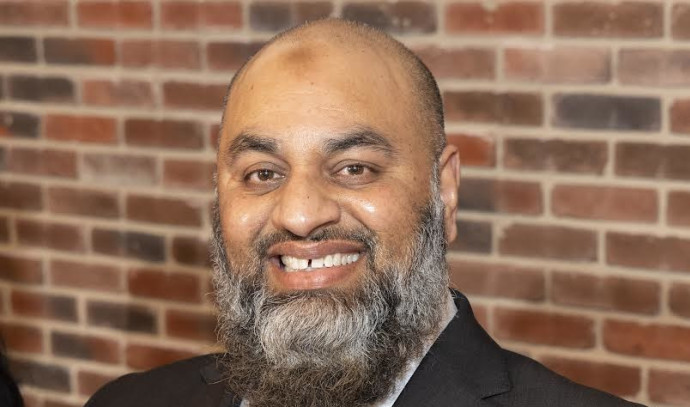“I joined a Jihadist organization very early on in my life,” reminisced Noor Dahri in an exclusive interview with The Jerusalem Post. Dahri, nowadays a peace activist and head of Islamic Theology of Counter-Terrorism think tank (ITCT), was born and raised in Pakistan. “I was a very extreme person in my young life and my goal was to fight infidels in the name of Allah because they were enemies of Islam according to the Jihadist ideology I adhered to.”
Dahri describes himself as a person who was always keen on conducting in-depth research before taking any action. “I was always open to new ideas and opinions, but my mind grew narrow as I joined that Jihadist organisation. As I took part in more and more activities, I slowly felt that there were many unusual things which were not making me satisfied as a religious person. See, I have been taught there that whatever I do is for Jihad and Allah, but some things were completely political rather than religious,” he reminisced.
Those political actions made Dahri grow disillusioned from the organization he was part of, and he ended up feeling exploited in the name of the organization, for which he decided to finally leave it. Nowadays Dahri defines himself as someone who de-radicalized himself with no outside help. “Thank God, I had some knowledge of what Islam really was and quickly realized that something was not good there, so I left the Jihadist life,” he added.
“Once you are part of a Jihadist system and you come out of it, you can never be the same person you were before. I was no longer an ‘ordinary Muslim,’ but rather, thanks to the full military training I got, I was now a trained militant, who possessed both anger and motivation. I became infused with Jihadist ideology, which cannot be taken away easily. I became very angry and disappointed, and I even decided to leave my faith for some time, as well as my country,” Dahri remembered.
For the last decade Dahri strives to educate young Muslim generations and, as he puts it, save them from the curse of Islamist extremism that successfully ruined his young life, his dream to become a doctor, and his ambition to be a peaceful Muslim. “I have established my organisation called the Islamic Theology of Counter Terrorism (ITCT) and along with my team we conduct research, publish reports, and write articles, all in an attempt to educate the new Muslim generation. Nevertheless, right now we hardly receive any funding, so our work is extremely slow at the moment, unfortunately.”
Regarding his views on Israel and Zionism, Dahri elaborated: “For me, Zionism is a political ideology which gives religious, political, and historical background to the Jewish people to live and exist in their Holy Land. Any person from every walk of life who holds this simple concept to be true can be named a Zionist. As for myself, I try to educate my Muslim community that there is no harm in possessing the political conviction of Zionism, and that it does not contradict our religion in any way.”
The twofold Pakistani communities
Dahri draws a distinction between two types of Pakistani communities across the globe: ‘original’ Pakistanis living in Pakistan or abroad, and descendants of Pakistani immigrants who are born and raised outside Pakistan, especially in the West. Surprisingly, Dahri points at those second and third generation Pakistanis living in Western countries as those more inclined to hold antisemitic and anti-Zionist views.
“Original Pakistanis understand the nature of the Israeli-Palestinian conflict if you only spend some time with them and engage them with facts and logic. On the other hand, Pakistani next generations born and raised in the West have unfortunately closed their minds on this issue, and they are more antisemitic than Pakistanis living in Pakistan,” Dahri explained.
“I have worked with Pakistanis living in Pakistan and engaged them with educational initiatives with regards to accepting the reality and existence of the State of Israel, and I was pretty successful in my quest. However, it is extremely difficult to engage Pakistanis in the UK in the same way, because they are radicalised against Israel or Israelis twice: not only in Islamic institutions, but also in the Western education. These second and third generation Pakistanis are exposed to friends, colleagues, managers, supervisors, and lecturers – all of which possess stark hatred towards Israel, and this is how they have been indoctrinated doubly against Israel and Jews.”
Dahri stressed that Pakistan as a country does not reject the existence of the state of Israel and never threatened Israel’s sovereignty, also adding that intelligence agencies of both countries had worked together in the past. According to Dahri, Pakistan’s formal stance calling to establish an independent Palestinian state is intended mainly to “shut the mouths of Pakistani Mullahs (religious leaders).”
“Israel and Pakistan are not at all enemies,” he continued. “There are several Pakistani politicians, journalists, academics, military generals and people in decision-making posts who have worked previously to establish ties between countries, and still wish to normalize relations with Israel; but they hold that the only barrier between them and officially getting closer to Israel is that condition of establishing a Palestinian state.”
A lone voice
Dahri described his feelings as a lone voice supporting Israel. “Since the Israel-Hamas war started in October 2023, I am the only Muslim Pakistani in my community who has openly supported Israel’s right to fight against Hamas and I have paid a heavy price, still paying it in fact, in terms of sacrificing relations with family, friends, and colleagues, as well as my job.
“It is not at all a simple path to follow,” he added. “It’s a journey where you can face unpredictable twists and turns, as well as sufferings and pressure from every person close to you. Being a Muslim, vocal Zionist and unconditional supporter of Israel means risking my life and getting life threats for which I cannot attend prayer at any mosque in my city. This is not only an emotional hardship but also a psychological and religious trauma which I am facing for standing firm with Israel and the Jewish people.”
Despite these hardships, Dahri finds inspiration and strength from his religion and role models. “My role model is Mohammad, the Prophet of Islam. This is because he has many qualities that have inspired me both religiously and politically. For example, he was not only a religious figure but a political leader. He played different roles in different occasions, such as a military general, head of the state, judge, businessman, arbitrator, and a gospel carrier of human rights in his region, introducing a reformed system which went openly against the prevalent tribal system of the time. He was a loving father and patient husband. He introduced legal and financial reforms that changed the contemporary economy. No one has such qualities at the same time but him.”
Dahri also has some tips for the pro-Israel community. “Antisemitism is a global issue, and Jews were always treated as easy targets across the globe. My advice to Israelis is: don’t be too apologetic, don’t be too scared and don’t be too soft and too open, which are perceived as weaknesses in these parts of the world. Anti-Israel actors never had very democratic or soft attitudes towards Jews, therefore Jews must come out of this soft attitude as well.
“From what I see, many within the young generation of Jewish communities in Western countries are too scared to attend protests and show their support for Israel. The numbers are too low, while you can see school children filling the streets against Jews,” he added.
Additionally, Dahri calls for pro-Israel actors to engage more actively with Muslim communities in their areas. “My message to Jewish and Zionist communities around the globe is that they must start working with Muslim communities, meet them, invite them to events, attend Muslims events themselves, and educate themselves about each other’s culture, religion, and way of life.
“There are myriads of Muslims in the UK who have never met a single Jew, due to barriers made between them and the Muslims,” added Dahri. “You must try to fill the gap, be the bridge rather than the barrier, and work together – otherwise you will see radical Islamists successfully filling the gap between Jewish and Muslims communities, as they have already started doing. Our communities share major resemblances and similarities and therefore we both must work hard to break the barriers and meet.”







